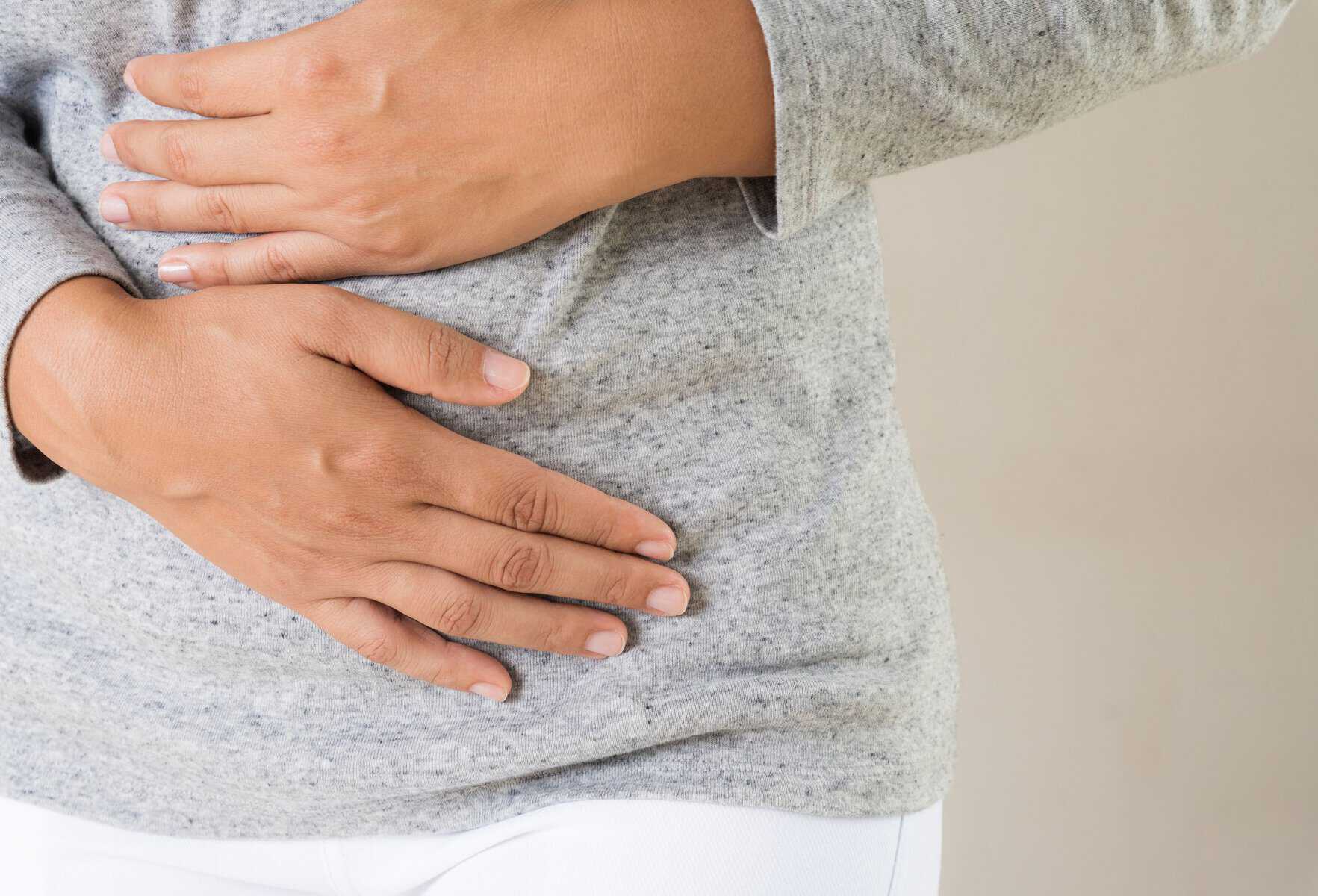 We have all felt that too full feeling. The one that has you reaching to loosen your belt and pop open the buttons on your pants. Sometimes we know what caused that feeling, however, sometimes we are left scratching our heads.
We have all felt that too full feeling. The one that has you reaching to loosen your belt and pop open the buttons on your pants. Sometimes we know what caused that feeling, however, sometimes we are left scratching our heads.
Why We Bloat
Medically speaking, bloating is the condition in which the belly (abdomen) feels full and tight.
Your belly may also look swollen (distended). Bloating occurs when the organs of your digestive system are stretched and can cause mild discomfort to intense pain.
The most common cause of bloating is a buildup of solids, liquids, or gas in the stomach and intestines (byproducts of digestion). However, it can also occur when your stomach contents move too slowly, you have weak muscles in your stomach wall, or your diaphragm contracts instead of relaxing.
Why Am I Bloated?
There are many reasons that you could be feeling bloated. The most common reasons include:
EATING BEHAVIOUR
Are you guilty of eating too quickly or eating past the point of fullness? If you answered yes, this could be why you are bloated.
When you eat, you swallow air. When you eat quickly, even more air is swallowed. This air (gas) travels through your digestive system, and in combination with the food eaten, can cause your digestive organs to stretch past the point of comfort. You can create that same feeling by eating more food than your stomach can handle. While your stomach is a muscle, it has a comfortable stretch limit, so if you surpass that, you get bloated.
FOOD CHOICES
Your food choices play a huge role in whether you feel bloated. Foods and drinks that have been linked to bloating include high salt, high sugar, and high fibre foods, alcohol, and bubbly drinks.
Foods rich in salt, sugar, and fibre, cause water to pool into the intestines. This movement of water causes the intestines to stretch, and you to feel bloated. A fibre rich diet can also cause bloating thanks to your gut bacteria. Gut bacteria feed on fibre and release gas as a byproduct. Lots of fibre can create lots of gas, leading to bloating. Similarly, the gas you consume in fizzy drinks can cause you to bloat.
INTOLERANCES & ALLERGIES
Bloating is a typical symptom of food intolerances and allergies. Intolerances and allergies can cause excessive gas production or gas to become trapped in the gastrointestinal tract. Common food intolerances include lactose, wheat, and sugar alcohols. Common food allergies include eggs, dairy, peanuts, tree nuts, and shellfish.
MEDICAL CONDITIONS
Several medical conditions can cause bloating and other digestive symptoms. Common ones include:
Constipation
Constipation can contribute to bloating. With increasing time spent in your colon, your stool continues to ferment, producing more gas and bloating.
Coeliac Disease
The ingestion of gluten sets off an immune response in people with Coeliac Disease. This immune response leads to inflammation of the digestive tract that can lead to bloating. More information on the management of Coeliac Disease is available here.
Irritable Bowel Syndrome (IBS)
Bloating is one of the main symptoms experienced by those with IBS.
SIBO
Small Intestinal Bacterial Overgrowth is an imbalance of the microorganisms in your gut that support healthy digestion. When too many bacteria, or the wrong type populate the small intestine, it can lead to uncomfortable symptoms such as gas.
Gastroparesis
Gastroparesis is a condition that affects the normal movement of the muscles in your stomach. The condition causes your stomach motility to slow or not work at all, causing your stomach contents to pool in your stomach, leading to bloating.
Bloating can also be caused by hormone fluctuations that occur during menstruation.
Beat The Bloat
There are some simple tips you can follow to help beat the bloat.
- Eat slowly.
- Eat smaller meals with healthy snacks in between to avoid eating more than your stomach can handle.
- Learn your triggers and avoid/limit them.
- Limit your consumption of ultra-processed foods (high in sugar and salt).
- Drink more water and limit consumption of carbonated drinks and alcohol.
- Add fibre to your diet, but slowly.
- Move more. Walking and other simple exercises can help get the digestive system moving.
- Give yourself a belly rub. Abdominal massages can help get the gasses moving through the digestive tract and improve the bloat sensation, particularly if it is painful.
- Seek treatment for constipation if you have it.
When To Ask for Help
On its own, bloating rarely signifies that something is seriously wrong. However, should you not achieve relief using the steps above, you should consult a medical professional. It is particularly important to seek medical attention if you have bloating in combination with one or more of the following:
- Diarrhoea
- Changes in colour or frequency of your stools
- Blood in your stools
- Persistent or severe abdominal pain
- Heartburn that is getting worse
- Vomiting
- Loss of appetite or feeling full quickly, or
- Loss of weight.
These additional symptoms can signify that something more serious is going on.
Are you looking for more help to improve your gut health? Check out our Guide to Gut Health. Have questions? Our team are here to help!
References:
American College of Allergy Asthma & Immunology. (2022). Food Allergies. ACAAI. https://acaai.org/allergies/allergic-conditions/food/
Azpiroz, F., & Malagelada, J. R. (2005). Abdominal Bloating. Gastroenterology, 129(3), 1060–1078. https://doi.org/10.1053/J.GASTRO.2005.06.062
Food Allergy Research & Education. (2022). Recognizing and Treating Reaction Symptoms. FARE. https://www.foodallergy.org/resources/recognizing-and-treating-reaction-symptoms
Hasler, W. L., Wilson, L. A., Parkman, H. P., Nguyen, L., Abell, T. L., Koch, K. L., Pasricha, P. J., Snape, W. J., Farrugia, G., Lee, L., Tonascia, J., Unalp-Arida, A., & Hamilton, F. (2011). Bloating in Gastroparesis: Severity, Impact, and Associated Factors. The American Journal of Gastroenterology, 106(8), 1492. https://doi.org/10.1038/AJG.2011.81
Health Direct Australia. (2021). Bloating. https://www.healthdirect.gov.au/bloating
Koch, K. L., & Stern, R. M. (1990). Functional disorders of the stomach. Seminars in Gastrointestinal Disease, 1(1), 23—36. http://europepmc.org/abstract/MED/11537400
Lacy, B. E., Gabbard, S. L., & Crowell, M. D. (2011). Pathophysiology, Evaluation, and Treatment of Bloating: Hope, Hype, or Hot Air? Gastroenterology & Hepatology, 7(11), 729. /pmc/articles/PMC3264926/
National Institute of Diabetes and Digestive and Kidney Diseases. (n.d.). Gas in the Digestive Tract. NIH. Retrieved September 7, 2022, from https://www.niddk.nih.gov/health-information/digestive-diseases/gas-digestive-tract
Phillips, M. M. (2020). Abdominal bloating. In MedlinePlus Medical Encyclopedia (Vol. 310, Issue 15). MedlinePlus Medical. https://doi.org/10.1001/jama.2013.280496
Royal Children’s Hospital Melbourne. (2016, November 11). Allergy and Immunology. www.allergy.org.au
Trull, K. (2022). What Causes Abdominal Bloating. Medical News Today. https://www.medicalnewstoday.com/articles/321869#causes



